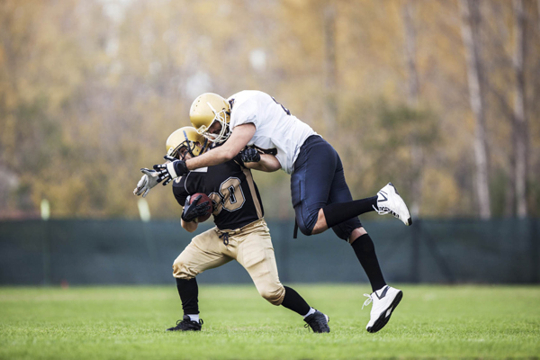When you think of a concussion, you may envision someone getting whacked in the head and knocked out. In reality, however, a concussion is often subtler. Frequently, a person who suffers a concussion may not lose consciousness. Because of this reality, it’s important for parents to know the signs and symptoms of a concussion to keep kids safe and help them get the treatment they need.
A concussion is a type of traumatic brain injury. Your brain is cushioned by spinal fluid inside your skull that normally acts as a protective barrier against injury. If something – like a fall or blow to the head – causes the brain to hit the skull, that’s when a concussion can occur.
When it comes to our children, we typically think of participation in contact sports like football, hockey and soccer as the main risk factors for a concussion. However, virtually any activity that kids take part in – from riding a bike to climbing a tree – increases their risks. Annually, as many as two million children in the United States suffer a concussion. Fortunately, most of them are mild and have no long-lasting effects.
The Symptoms of a Concussion
The symptoms of a concussion can include physical, cognitive, emotional and sleep-related issues. They can develop immediately after the concussion or up to 48 hours later.
If your child suffers a head injury, seeking emergency medical care immediately is always the best approach. Also, stay alert for the following symptoms:
- Physical: Headache, dizziness, balance problems, nausea and vomiting, or sensitivity to light and noise.
- Cognitive: Mental fogginess, feeling slow, difficulty concentrating, difficulty remembering and difficulty focusing.
- Emotional: Irritability, sadness, anxiety and being more emotional than usual.
- Sleep-related: Trouble falling asleep, and sleeping more or less than usual.
What to Do After a Concussion
Follow all of your doctor’s recommendations for treatment. If your child is in pain and you want to give them an over-the-counter pain reliever, stick to acetaminophen (Tylenol). Pain relievers such as ibuprofen (Advil or Motrin IB) and aspirin can increase the risk of bleeding.
If your child plays sports, they should stop playing until they are cleared by a doctor. For this reason, many kids will downplay their injury, so it is up to you to identify a potential concussion and when it’s time for them to seek treatment and rest.
Managing a child’s concussion should be a collaborative approach between parents, doctors, teachers, coaches and trainers. In addition to taking a break from sports and physical activities while they recover, children suffering from a concussion will also need mental rest.
Mental rest is important because the brain needs time to recover from injury. In the same way you would rest a sore or injured muscle to give it time to heal, the brain needs the same healing period for several days after a concussion.
During a mental rest period, your child should be excused from challenging cognitive activities, such as school work, homework and use of technology. Cell phones and texting, computers, video games, television and loud music should all be restricted.
Reducing the Risk of Concussions
There are many ways parents and coaches can help to reduce the risk of concussions. The most important is the proper use of correctly fitting safety equipment, such as helmets, both on and off the playing field when required. Children should also be coached on the proper techniques for tackling and absorbing impact in contact sports. Neck strengthening exercises can also help cushion the forces that cause concussions.
By working together as a team, the adults in a child’s life can help reduce the risk for concussions and manage them properly when they occur.
About Crozer Keystone Staff
Crozer-Keystone Health System’s physicians, specialists and advanced practitioners are committed to improving the health of our community through patient-centered, quality care across a full continuum of health services. Crozer Brinton Lake is Crozer-Keystone’s comprehensive outpatient care facility in western Delaware County, offering primary care, specialty services, outpatient surgery and advanced cancer treatment. Contact us: 300 Evergreen Drive, Glen Mills, PA 19342 http://www.crozerkeystone.org/Brinton-Lake 1-855-254-7425
- Web |
- More Posts(131)



Comments